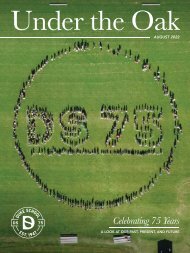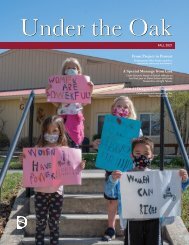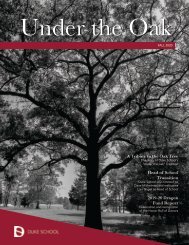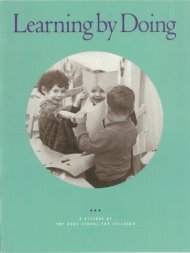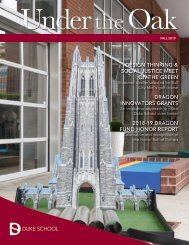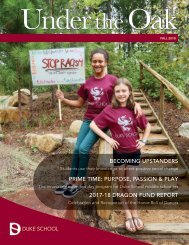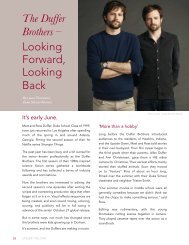You also want an ePaper? Increase the reach of your titles
YUMPU automatically turns print PDFs into web optimized ePapers that Google loves.
Life After <strong>Duke</strong> <strong>School</strong>: Princeton in Africa<br />
PRINCETON IN AFRICA<br />
Shan’s interest in Africa began when he studied<br />
abroad in Tanzania during his junior year at<br />
Bowdoin.<br />
“My academic focus has been in conservation<br />
biology and wildlife conservation, and I was really<br />
captivated by <strong>the</strong> biodiversity of <strong>the</strong> region as<br />
well as <strong>the</strong> issues surrounding conservation and<br />
human-wildlife conflict.”<br />
Princeton in Africa (PiAf) is an independent,<br />
nonprofit organization that offers year-long<br />
fellowships in partnership with organizations<br />
across <strong>the</strong> continent.<br />
Shan Nagar has always loved being outdoors<br />
— something that contributed to him finding<br />
his current role as Volunteer Coordinator and<br />
Sustainability Fellow at Nyumbani Village in Kenya<br />
through <strong>the</strong> Princeton in Africa program.<br />
A self-proclaimed <strong>Duke</strong> <strong>School</strong> “lifer,” Shan began<br />
<strong>Duke</strong> <strong>School</strong> as a preschooler and graduated<br />
in 2008. From <strong>Duke</strong> <strong>School</strong> he graduated from<br />
Durham Academy in 2012, and Bowdoin College<br />
in 2016. He is <strong>the</strong> oldest sibling of three, who are<br />
all <strong>Duke</strong> <strong>School</strong> graduates.<br />
“I have such a deep, deep fondness for <strong>Duke</strong><br />
<strong>School</strong>,” he says. “So much of my ability to work<br />
and live independently, think critically, and be<br />
creative, I attribute to <strong>the</strong> 11 years I spent as a<br />
student <strong>the</strong>re.”<br />
“When <strong>the</strong>y saw that I was comfortable living<br />
and working in rural conditions, and that I was<br />
interested in environmental work, <strong>the</strong>y put me<br />
up for consideration with Nyumbani Village,” he<br />
explains.<br />
NYUMBANI VILLAGE<br />
Nyumbani Village is a sustainable HIV/AIDS<br />
community in Kenya that spans more than 1,000<br />
acres and houses roughly 1,000 children and 100<br />
grandparents affected or infected by HIV/AIDS.<br />
They use a family group model — each household<br />
consists of ten children and one grandparent. The<br />
village boasts a robust Sustainability Department,<br />
in an effort to be completely self-sustaining.<br />
“These programs focus on both waste reduction<br />
and generating revenue, and include raising<br />
livestock for food and to sell in market, a 500-<br />
acre agroforestry project, and large complex of<br />
greenhouses, and a variety of water harvesting<br />
systems,” Shan says.<br />
22<br />
UNDER THE OAK


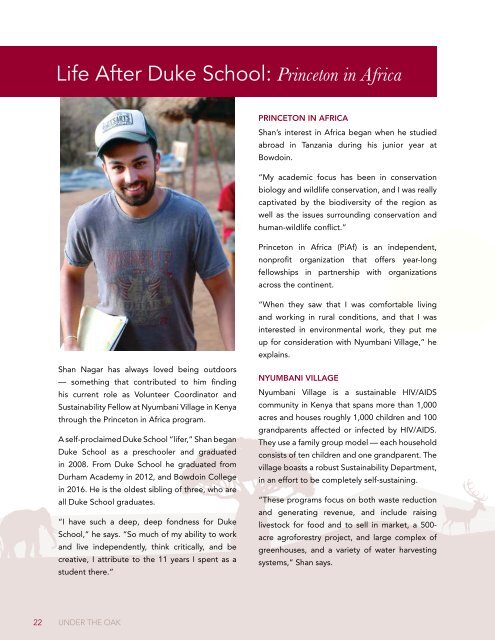

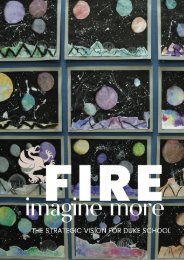
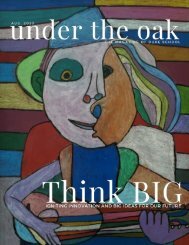
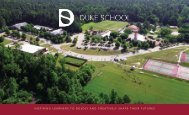

![Under the Oak 2023 [FINAL5] (1)](https://img.yumpu.com/68405392/1/190x245/under-the-oak-2023-final5-1.jpg?quality=85)

